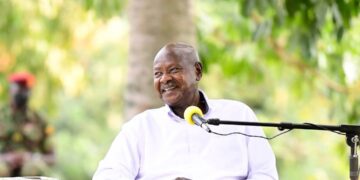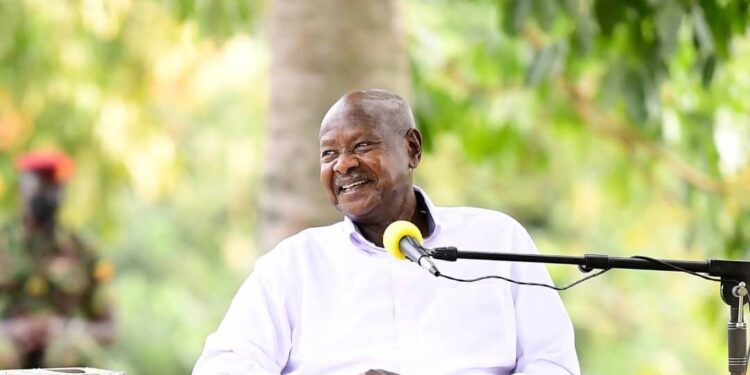Luanda: President Museveni has said that the problem of the Great Lakes Region cannot be resolved by military means alone, saying other critical issues such as elections must be taken into consideration.
“It is important to recognize that the real Supreme Court to any political argument is free, fair and regular elections without exclusion of anyone or group that qualifies within the establishment of the Constitution”.
The President’s remarks were contained in a statement made on his behalf by Vice President Jessica Alupo to the Heads of State and Government currently attending the 10th Extraordinary Summit of the International Conference of the Great Lakes Region (ICGLR) in Luanda.
The Summit was chaired by João Manuel Gonçalves Lourenço President of the Republic of Angola- Chairperson of the ICGLR, and AU Champion for Peace and Reconciliation in Africa and attended by among others, Uhuru Kenyatta, Former President of the Republic of Kenya and Facilitator of the EAC- led Nairobi process, several other heads of State and Government including President Félix Tshisekedi of the Democratic Republic of Congo, the Chairperson of the African Union Commission, the Executive Secretary of the International Conference on the Great Lakes Region, among others.
Below is the abridged statement:
The Great Lakes Region has had many challenges, for a while, including terrorism by negative elements such as the Allied Democratic Forces.
We salute H.E. Felix Antoine Tshisekedi Tshilombo, President of the DRC, for jointly working with Uganda on this matter.
A lot of effort has been made towards stabilising Eastern DRC, on account of the key decisions that have been adopted so far, under both the Nairobi and Luanda processes including but not limited to the Mini-Summit of the EAC and ICGLR convened on 17 February 2023, in Addis Ababa, by H.E Manuel Lourenço, President of the Republic of Angola.
This Summit was followed by the meeting of the African Union Peace and Security Council at the level of Heads of State on the same day on the same subject.
The underlying objective of all these processes is to seek to fulfil the objectives and commitments of the Parties to the Peace Security and Cooperation Framework for the DRC and the Region of 24 February 2013.
We are deeply concerned about the dire humanitarian situation in the Country. As of 30 April 2023, Uganda is currently hosting 489,229 refugees from the DRC alone. We support all efforts aimed at alleviating this situation and urge the AU Commission, and the International Community, to continue supporting the humanitarian efforts of the Government including through convening a humanitarian pledging conference dedicated to eastern DRC.
We wish to report that in line with the Decisions of the Addis Ababa Mini Summit held on 17 February 2023; On 29 March, Uganda flagged off a Contingent of Troops to join the East African Community Regional Force to help the DRC stabilise the Bunagana-Rutshuru-Goma area where the M23 has been operating against the DRC Government. We take note of the gains made so far by the EAC Regional Force.
We welcome the report and the recommendations by H.E Uhuru Kenyatta, Former President of the Republic of Kenya, and Facilitator of the EAC- led Nairobi process. We underscore the importance of the political track taking into account the fact that the problem of the Great Lakes Region cannot be resolved by military means alone.
We reiterate the importance, for all States Parties of the EAC, to respect and implement decisions of the Summit and obligations agreed upon in previous meetings of Heads of State; and other established instruments on the restoration of peace and security in eastern DRC.
We reiterate our full support for the Nairobi and Luanda Processes; and support the full and timely implementation of the decisions of the 21st Extra-Ordinary Summit of the East African Community Heads of State held on 31 May 2023 in Bujumbura as it relates to the Peace and Security situation in Eastern DRC and the mandate of the East African Community Regional Force, and the Communiqué of the meeting of the African Union Peace and Security Council held at the level of the Heads of State and Government on 17 February 2023.
To this end, we wish to emphasise the following:
(i) Citizens are the owners of the country and they should be given the opportunity, at all times, to participate in taking decisions concerning their Country.
(ii) It’s important to recognise that the real Supreme Court to any political argument is free, fair and regular elections without exclusion of anyone or group that qualifies within the establishment of the Constitution.
(iii) There should be immediate de-escalation and unconditional cessation of hostilities to create an enabling environment for the peaceful means of resolving the conflict to take place.
(iv) There should be Integration of the fighting forces into the National and Professional Army with correct Ideology as it has happened in many parts of Africa including Uganda.
(v) In the process of conflict, warring parties make mistakes. We, therefore, call on all stakeholders in the DRC to embrace and promote dialogue and reconciliation as a way of putting an end to violence. This is because if the different actors in the conflict are convinced that reconciliation is possible, they would be more likely to agree to a ceasefire without fear of any reprisals.
(vi) There is a need to address the underlying root causes and drivers associated with Youth participation in violence, including through supporting socio-economic programs, aimed at empowering them, especially Women and Youth. This will, re-orient our people away from the Politics of Identity to the Politics of Interest.
(vii) The AU Commission; the Secretariats of the EAC and the ICGLR should mobilise financial and technical support to support the peace processes in eastern DRC, especially as it relates to the deployment of the EAC- Regional Force.









